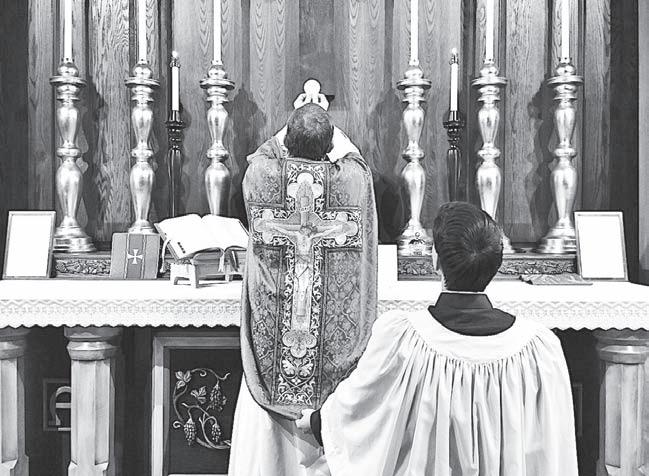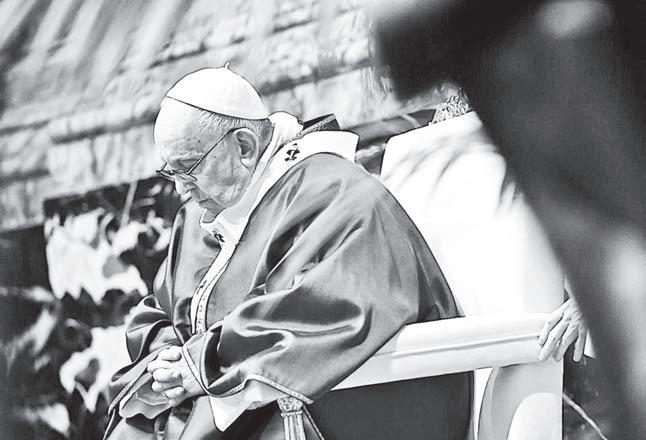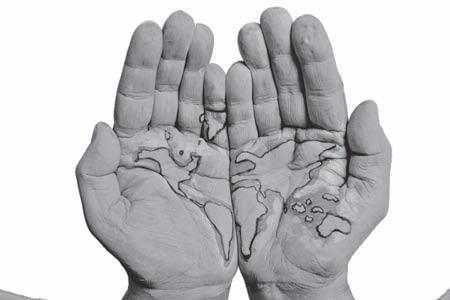
3 minute read
Pope intervenes anew, restricts the celebration of Latin Mass
ROME—Pope Francis has intervened for the third time to crack down on the celebration of the old Latin Mass, a sign of continued friction with Catholic traditionalists.
Francis reasserted in a new legal decree published last Tuesday that the Holy See must approve new celebrations of the old rite by signing off on bishops’ decisions to designate additional parish churches for the Latin Mass or to let newly ordained priests celebrate it.
The decree states that the Vatican’s liturgy office, headed by British Cardinal Arthur Roche, is responsible for evaluating such requests on behalf of the Holy See and that all requests from bishops must go there.
For weeks, Catholic traditionalist blogs and websites have reported a further crackdown on the old Latin Mass was in the works, following Francis’ remarkable decision in 2021 to reimpose restrictions on its celebration that were relaxed in 2007 by then-Pope Benedict XVI.
Francis said at the time that he was acting to preserve church unity, saying the spread of the Tridentine Mass had become a source of division and been exploited by Catholics opposed to the Second Vatican Council, the 1960s meetings that modernized the church and its liturgy.
Roche’s office followed up a few months later to double down on the Vatican’s position with a series of questions and answers that made clear that celebrating some sacraments according to the old rite was forbidden.
The new decree doesn’t restrict the celebration further but merely repeats what was previously declared. Its insistence on Roche’s authority in the process appeared aimed primarily at quashing traditionalist claims that the cardinal had exceeded his mandate.

Francis signed off on the decree on Monday during a private audience with Roche.
Francis’ crackdown on the old Mass outraged his conservative and traditionalist critics, many of whom have also attacked him for his focus on the environment, social justice and migrants.
Francis says he preaches the Gospel and what Jesus taught, and has defended the restrictions by saying they actually reflect Benedict’s original goal while curbing the way his 2007 concession was exploited for ideological ends.
Joseph Shaw, chairman of the Latin Mass Society in Britain, which promotes the old Mass, called the new document “grave” since it confirmed that bishops need explicit permission from Roche’s office to use parish churches for Tridentine Masses.
In a series of tweets, Shaw noted that when the office has been asked for such permissions to date, the office “has typically been restricting the number of locations and giving the permission for only two years.” disciples is an anticipation of Easter glory, and that must be the goal of our own journey, as we follow ‘Him alone,’” he said. “Lent leads to Easter: the ‘retreat’ is not an end in itself, but a means of preparing us to experience the Lord’s passion and cross with faith, hope and love, and thus to arrive at the resurrection,” he added.
He said that would lead to uneven access to the old Mass, where it would be easy to find alternative locations in some places but impossible in others.
Pope Francis compared the journey of Lent and the Church’s ongoing Synod on Synodality to a “strenuous mountain trek.”
While we hike up the mountain, we must keep our eyes on the path before us, but at the top, we are rewarded by the beautiful panorama that confronts us.
“So too, the synodal process may often seem arduous,” he said, “and at times we may become discouraged. Yet what awaits us at the end is undoubtedly something wondrous and amazing, which will help us to understand better God’s will and our mission in the service of His kingdom.”
The Vatican’s Dicastery for Promoting Integral Human Development announced on February 17 that it will hold a communication campaign based on Pope Francis’s Lenten message.
Beginning on Ash Wednesday, February 22, the dicastery will present every week, via its website, a new “step” on the journey of Lent.
The campaign, “With Him on the mountain: Lenten penance and the synodal journey,” will include reflection questions based on Scripture passages and the pope’s message.
“The Lenten journey of penance and the journey of the Synod alike have as their goal a transfiguration, both personal and ecclesial,” Pope Francis said. “A transformation that, in both cases, has its model in the Transfiguration of Jesus and is achieved by the grace of His paschal mystery.”

The pope also spoke about the newness of Christ and His fulfillment of the ancient covenant.
“In a similar way, the synodal journey is rooted in the Church’s tradition and at the same time open to newness,” he said. “Tradition is a source of inspiration for seeking new paths and for avoiding the opposed temptations of immobility and improvised experimentation.”
Francis said a Lenten penance “is a commitment, sustained by grace, to overcoming our lack of faith and our resistance to following Jesus on the way of the cross.”
“To deepen our knowledge of the Master, to fully understand and embrace the mystery of His salvation, accomplished in total self-giving inspired by love, we must allow ourselves to be taken aside by Him and to detach ourselves from mediocrity and vanity,” he encouraged.
“We need to set out on the journey, an uphill path that, like a mountain trek, requires effort, sacrifice and concentration,” he said. Cathoic News Agency via CBCP News










